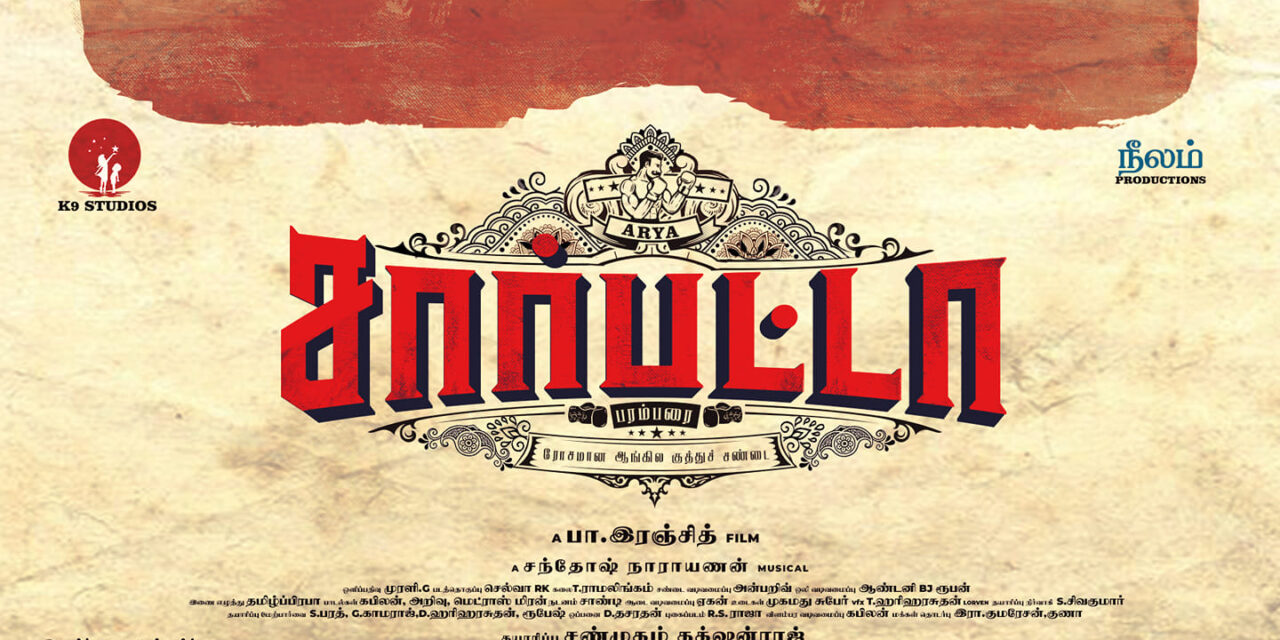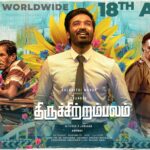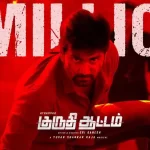Director: Pa.Ranjith
Cast: Arya, Shabeer Kallarakkal, Pasupathy, John Kokken, John Vijay, Dushara Vijayan, Kalaiyarasan, Santhosh Prathap, Anupama Kumar, Sanchana Natarajan, Kaali Venkat, Maran, Vettai Muthukumar, GM Sundar
Whenever we post a review on this site, we include up to three or four names in the ‘Cast’ section at the most, names that usually pick themselves. Here, we’ve included fourteen names. Though we’ll touch more upon this later, this is to the credit of the makers of Sarpatta Parambarai, arguably the film of the year so far.
At its core, Sarpatta is an underdog sports drama. If you ask any average film watcher, he/she would probably be able to list down all the tropes associated with this genre in a trice. Be it a protagonist who’s written off by popular opinion, a cunning rival who’s apparently invincible, or infighting that puts a spanner in the works, Sarpattai Parambarai has it all. Yet, the script doesn’t come off as cliched even for a bit.
Set in the 1970s, Sarpatta tells the story of the boxing clans of North Madras. Though we are told there are a handful of these clans or ‘Paramparais’ in existence, two take centerstage as the fiercest rivals: the Sarpatta clan led by coach Rangan (Pasupathy) and the Idiyappa clan. While the Sarpatta clan’s reputation is on a downhill slide, the Idiyappa clan has grown in prominence over the years. The Sarpatta folk also find themselves increasingly at the receiving end of taunts and jibes from the Idiyappa folk, thanks to Sarpatta’s fast declining relevance. Things escalate, and to settle matters once and for all, the Sarpatta are challenged by the Idiyappas to participate in a deciding bout.
Circumstances lead to Kabilan (Arya), a boxing fanatic but a rookie, being chosen to represent Sarpatta in the bout. While this choice is widely ridiculed, Kabilan’s natural talent for boxing doesn’t go unnoticed. However, there are forces beyond boxing at work too. All is not harmonious within the Sarpatta clan and there are some families within the clan who would go to any means to ensure Kabilan doesn’t succeed. There are also problems at a more macro level. Political turmoil ensues when the Emergency is imposed and this threatens to derail Kabilan’s run in unforseen ways.
The structure of Sarpatta’s plot isn’t unique. There are various factors however that make this a stand out film, and dare I say, a masterpiece. The first has to be the characters in the film and the casting. I don’t remember another film from recent times where each cast member and character left such an indelible mark. There are too many of these characters to write about, but let me speak about a few. The Dancing Rose character, played by Shabeer Kallarakkal, is the clear winner, oozing with charisma and taking the audience completely by surprise. His words during the climax about fair play and sportsmanship have resonated widely and have brought him cult status. Then, there is the character of Kevin aka Daddy (John Vijay), Kabilan’s side kick. An Anglo Indian who speaks Tamil with a hilarious smattering of English, all the scenes he appears in are a riot. Also, true to his nickname, he plays the role of a friendly, fatherly figure to Kabilan, who lost his own father as a child. Finally, Pasupathy’s portrayal of Rangan has to be mentioned. Rangan’s character sketch is very interesting. He’s not just a boxing coach, but also a respected local political leader. Pasupathy owns this complex role with a performance of great poise and depth and reminds us why he’s probably the best character actor we have in the industry at the moment.
The discussion on Rangan’s character brings us to another key highlight-the highly authentic period setting. In many films, the period setting either comes off as a gimmick or isn’t picturized in an authentic enough way. In Sarpatta, not only is the set up extremely authentic (T.Ramalingam is the Art Director), the various political events during the time are woven expertly into the film’s script. These events don’t just provide a backdrop, they are active plot points that actually decide the course of the story. In a way, Time itself becomes one of the characters here, and plays an extremely important role in how proceedings unfold.
The writing in general is top notch. Though the film is almost three hours long, it never feels so. The dialogues are always crisp and often entertaining. Rangan’s Tamil translation of Muhammad Ali’s famous ‘sting like a bee’ quote had me in splits, as did the scene where Kevin’s wife throws hilarious English insults at him. R.K.Selva’s cuts are really slick, and even though the film is a sprawling one with a number of characters and incidents, his controlled editing ensures we never lose track.
In fact, as with any other Ranjith film, all technical aspects are brilliant. I loved G.Murali’s cinematography. He’s got his colour palette spot on for the period setting and his slow-mo close up shots during the boxing bouts are exhilarating to watch. Santhosh Narayanan delivers yet another effective score that blends superbly into the film’s tone and mood.
Ranjith is back with a film after almost three years. His previous films have mostly carried a commentary on caste and minority oppression. He does speak about oppression in Sarpatta too, but the focus here seems to be more on economic oppression rather than on religious or caste specific oppression. Many sequences prompt a thought that this film deserved a massive theatrical release. This didn’t materialize, but it doesn’t take any glory away from the film. This is probably Ranjith’s best work till date. After trips to Malaysia and Mumbai for his last two outings, Ranjith is back to the place he calls home: Madras.
Rating: 3.5/5
Sarpatta Parambarai is streaming on Prime.







